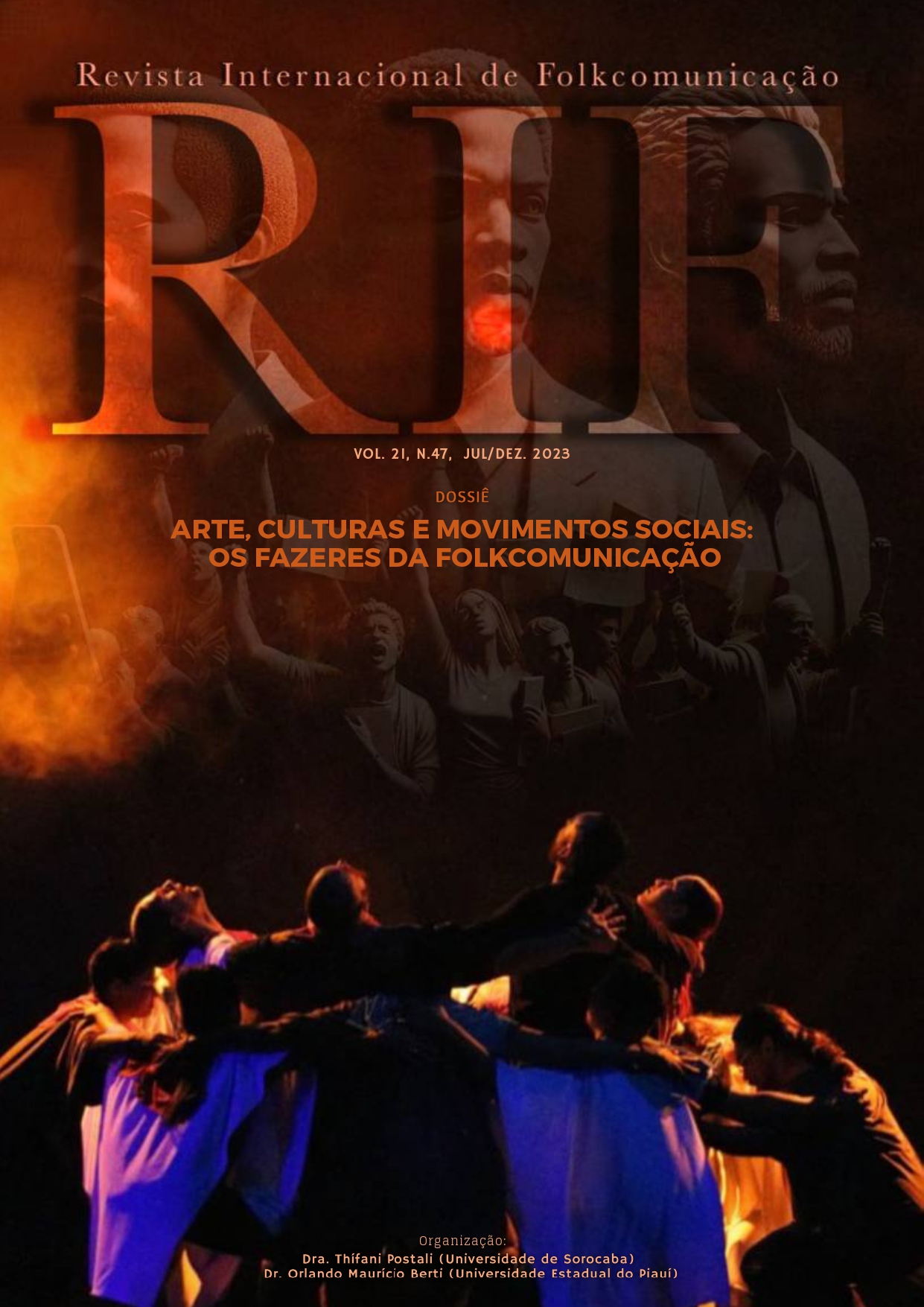“Nós é Ralé, mas não é Mané”:
“We are Ralé, but we are not Mané”: Folkcommunication, Social Movements and the Instituto Shopping Recife in the Entra Apulso Community.
DOI:
https://doi.org/10.5212/RIF.v.21.i47.0008Keywords:
Comunidade do Entra Apulso, Empreendedorismo, Folkcomunicação, Instituto Shopping RecifeAbstract
This study reflects on the intertwined relationships between social movements, folk-communication language and the role of business in generating employment and income in the Entra Apulso Community in the Boa Viagem neighborhood, south of Recife-PE. The article is based on ethnographic research with the author's observation while carrying out university extension projects in the location, and has a qualitative, as well as bibliographic, character. Folkcommunication is the methodological foundation from the title of the work, which presents the subaltern view regarding economic issues experienced by local residents and at the same time the sagacity of this social microcosm, an accurate portrait of a big house/slave Brazil, which passes to discover a new class format that is aware of its rights.
Downloads
References
AMPHILLO, Maria Isabel. Matrizes Teóricas: Estudos Científicos do Folclore Brasileiro. In
Melo, José Marques de; Fernandes, Guilherme Moreira (orgs.). Metamorfose da
Folkcomunicação. São Paulo: Editae Cultural, 2013.
BAUDRILLAD, Jean. A sociedade do consumo. Tradução: Artur Morão. Brasil: Edições 70,
BELTRÃO, Luiz. Folkcomunicação: a comunicação dos marginalizados. São Paulo: Cortez,
COSTA, José Wendson Gomes de Queiroz. Marketing 3.0, responsabilidade
socioambiental e empreendedorismo social: um estudo de caso sobre o Instituto
Shopping Recife. / José Wendson Gomes de Queiroz Costa. – Recife: O Autor, 2016.
Monografia 60f.
DEBORD, Guy. A sociedade do espetáculo. 2003. Disponível em:
<http://www.ebooksbrasil.org/eLibris/socespetaculo.html>. Acesso em: 25/06/2012
DUARTE, Jorge; BARROS, Antonio. Métodos e Técnicas de Pesquisa em Comunicação. São
Paulo: Atlas, 2010.
MEIRELLES, Renato; ATHAYDE, Celso. Um País Chamado Favela. São Paulo: Editora Gente,
PRAZERES, Michelle; RATIER, Rodrigo. O fake é fast? Velocidade, Desinformação,
Qualidade do Jornalismo e Media Literacy. Florianópolis: Estudos em Jornalismo e Mídia,
PROCÓPIO, Pedro. O Brasil Emergente nas Páginas de The Economist: Relações Entre
Economia e Discurso no Governo Lula. Recife: Bagaço, 2012.
RIBEIRO, Renato Janine. A sociedade contra o social: o alto custo da vida pública no Brasil.
São Paulo: Companhia das letras, 2000.
ROMERO-RODRIGUEZ, Luiz.; DE-CASAS, Patricia; PEDREIRA, Mari Carmen. Desinformación e Infoxicación en las cuartas pantallas. In: (Ed.). Competencias mediáticas en medios digitales emergentes. Salamanca: Comunicación Social Ediciones y Publicaciones, 2018. p. 73-92.
SAMARA, Beatriz Santos. Morsch, Marco Aurélio. Comportamento do consumidor: conceitos e casos. São Paulo: Prentice Hall, 2005.
WOITOWICZ, Karina Janz. Vozes Populares e Disputas Discursivas: Práticas de Ativismo(Folk) Midiático nos Movimentos Sociais. In SCHMIDT, Cristina; HOHLFELDT, Antônio;
MERGULHÃO, Eliane. A Comunicação dos Marginalizados nas Rupturas Democráticas. Porto Alegre: EdPUCRS, 2022.
Downloads
Published
How to Cite
Issue
Section
License

Este obra está licenciado com uma Licença Creative Commons Atribuição 4.0 Internacional.
Os autores são responsáveis, em qualquer que seja o formato do texto, pelas opiniões expressas ou indiretas presentes em seus respectivos trabalhos, não endossáveis pelo Conselho Editorial e pelos editores da Revista, bem como pela autenticidade do trabalho. Ao publicar trabalhos na Revista Internacional de Folkcomunicação, os autores cedem automaticamente os direitos autorais à publicação para veiculação das produções acadêmicas, sem ônus para a Revista. Os autores detêm os direitos autorais do texto para o caso de publicações posteriores e concedem à Revista Internacional de Folkcomunicação o direito de primeira publicação, com o trabalho simultaneamente licenciado sob a Creative Commons Attribution License, que permite o compartilhamento do trabalho com reconhecimento da autoria e publicação inicial nesta Revista. Por serem publicados em revista de acesso livre, os artigos são de uso gratuito, com atribuições próprias, em atividades educacionais e não-comerciais, sendo permitida a publicação simultânea em repositórios institucionais.































